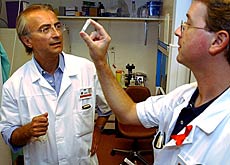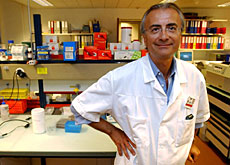Gates pumps millions into HIV vaccine research

Researchers in Lausanne are to receive $15.3 million (SFr19 million) from the Bill & Melinda Gates Foundation as part of a global drive to develop an HIV vaccine.
The team at the city’s University Hospital is one of 16 worldwide to benefit from the $287 million funding package announced by the Gates Foundation on Wednesday.
The grants, known collectively as “Collaboration for Aids Vaccine Discovery”, will support a range of approaches for designing an effective HIV vaccine. The global programme brings together more than 165 researchers from 19 countries.
Eleven teams – including the one in Lausanne – will focus on vaccine discovery, and these will be linked to five central laboratories and data analysis facilities.
This will allow researchers to share findings and compare results, so that the most promising vaccine work can be identified for further study. In the past, vaccine research has mainly been conducted by small groups working independently.
“We are delighted by this recognition of the work we have been carrying out at Lausanne University Hospital’s immunology and allergy department since 1998,” team leader Giuseppe Pantaleo told swissinfo.
“I think this programme represents a real cultural revolution. The main organisers are committed to ensuring transparency and for information to be circulated freely within the programme,” he added.
Smallpox
The Lausanne team will focus on the possibility of turning viruses related to smallpox into HIV vaccines. A separate project in London that has received $25.3 million from the Gates Foundation will isolate antibodies from humans and animals to see if they can neutralise HIV.
Aids was first described in 1981 and the human immunodeficiency virus that causes Aids was found soon after. But the complexity of the virus and its ability to mutate have frustrated scientists in their hunt for a vaccine.
The virus attacks the very immune cells that are usually stimulated by a vaccine, and mutates quickly to evade back-up immune responses. More than 30 vaccines are currently being tested in people, but scientists don’t expect any of them to prevent HIV infection in large numbers of people.
According to the United Nations, an estimated 38.6 million people live with HIV worldwide. Last year around 4.1 million people became newly infected with HIV, while some 2.8 million people died of Aids-related illnesses.
HIV/Aids research
The $287 million commitment over five years is the Gates Foundation’s largest single investment in the field of HIV/Aids research.
But Luc Perrin, head of clinical virology at Geneva University Hospital, cautioned against raising expectations too high.
Perrin said that while the donation by the Gates Foundation was “fantastic”, it was no guarantee of success.
“I have yet to see any fundamental research that shows we are on the way to finding an effective vaccine – and they have already been working on this for years,” he told swissinfo.
Perrin added that researchers were still at least ten years away from developing a vaccine – a view shared by Nicholas Hellmann, acting director of the Gates Foundation’s HIV, TB and reproductive health programme.
Hellmann, however, said he hoped the new collaborative approach in HIV vaccine research would speed up a process that “has confounded us for over 20 years”.
“Unfortunately, developing an effective HIV vaccine has proven to be tremendously difficult, and despite the committed efforts of many researchers around the world, progress simply has not been fast enough,” he said.
swissinfo, Adam Beaumont and Mathias Froidevaux
Professor Pantaleo has already conducted preliminary trials of a vaccine developed by EuroVacc – European Vaccine Effort against HIV/Aids – a Swiss-based foundation set up in 2002.
The trial on 24 volunteers in Lausanne and London achieved promising results, provoking an immune response in almost 45% of those tested. A more extensive trial, involving 40 volunteers, was launched in February last year.
According to newspaper reports on Thursday, the Swiss government has pledged to support the establishment of a national vaccine research institute in Lausanne.
In total, the 16 grants will support more than 165 researchers in 19 countries: Australia, Austria, Belgium, Britain, Cameroon, Canada, Denmark, France, Germany, India, Japan, Netherlands, South Africa, Spain, Sweden, Switzerland, Uganda, United States, and Zambia.

In compliance with the JTI standards
More: SWI swissinfo.ch certified by the Journalism Trust Initiative

You can find an overview of ongoing debates with our journalists here. Please join us!
If you want to start a conversation about a topic raised in this article or want to report factual errors, email us at english@swissinfo.ch.